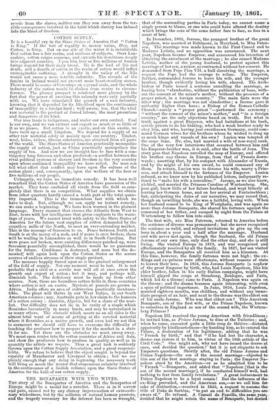COTTON SUPPLY.
Pr is a boastful cry in the Slave States of America that "Cotton is King." if the test of regality be money value, Hay, not Cotton, is King. But on our side of the water it is indubitable that cotton has a fair realm, and millions of subjects. Over Lan- cashire, cotton reigns supreme, and extends his dominions deeply into adjacent counties. Upon him four or five millions of human beings depend for their daily bread. He is the lord of life and death, and a dearth of cotton in the realm of cotton would inflict unimaginable suffering. A drought in the valley of the Nile would not cause a more terrible calamity. The records of the famine in Ireland would not present more heart-rending scenes. There would be scores of Coventrys on a grand scale, and the whole industry of the nation would be shaken from centre to circum- ference. The gloomy prospect is rendered more gloomy by the fact that the power of averting this calamity rests only partially with us. We have stimulated the growth of a vast industry, knowing that it depended for its life-blood upon the continuance of tranquillity in a foreign land ; well aware, too, that the vital raw material is the product of forced labour, the most precarious and dangerous of its kind.
Our iron trade is indigenous, and under our own control. Coal is our own, and we can extract and export as much or as little of it as we please. But cotton is an exotic, and on this exotic, we have built up a small kingdom. We depend for a supply of no other raw material solely or mainly upon one country. Timber, wool, hides, tallow, fibrous substances, are obtained from all parts of the world. The Slave States of America practically monopolize the supply of cotton, just as China practically monopolizes the supply of tea. And now we are brought face to face with a con- tingency long foreseen and often predicted—a conflict between the rival political systems of slavery and freedom in the very country upon whose continued tranquillity we have relied. No man can tell what effect that conflict may have upon the culture of the cotton plant ; and, consequently, upon the welfare of the four or five millions of our people.
Unhappily, we have no immediate remedy. It has been well remarked that the Cotton States of America have possession of the market. They have excluded all rivals from the field so com- pletely that there is no competition. What supplies we obtain from other quarters hardly exceed a tenth part of the total quan- tity imported. This is the tremendous fact with which we have to deal. But, although we can apply no instant remedy, we can make a beginning. We have been warned in the plainest language. Every steamer that crosses the Atlantic from West to East, bears with her intelligence that gives emphasis to the warn- ings of years. We cannot trust with safety to the Slave States of America for the future vast supplies of cotton demanded by the countless mills of the North, to meet an ever-extending market. This is the message of Secession to us. Peace between North and South is at the mercy of a mob, and if peace is once broken, there will be wailing in Lancashire as well as in South Carolina. But were peace not broken, were existing differences patched up, were Secession peacefully accomplished, there would be no guarantee for the future. Confidence is destroyed, and none but the de- mented: will again look upon the Cotton States as the secure sources of endless streams of their staple product.
The measure happily forced upon us is the gradual enlargement of the field of supply. Not one moment must be lost. It is not probable that a civil or a servile war will all at once arrest the growth and export of cotton; but it may, and perhaps will, diminish both. The deficiency must be made up from other sources. Now, there are boundless cotton fields in those countries where cotton is not an exotic. Myriads of pounds are grown in Africa. India offers an area of cultivation practically inexhaus- tible. The plant will thrive in our West Indies, in our South American colonies ; nay, Australia puts in her claim to the honours of a cotton colony ; Anatolia, Algeria, bid for a share of the mar- ket. Our difficulty does not lie in he rarity of a staple which flourishes luxuriantly in many lands, and may be naturalized in as many others. The obstacle which meets us on all sides is the almost total want of means of getting at the coveted material where it flourishes as a native growth, and even had we not this to surmount we should still have to overcome the difficulty of teaching the producer how to prepare it for the market in a state fit for use. Yet these are the obstacles we must sweep away. We must open routes into the cotton countries of Africa and Asia, and show the producers how to produce in quality as well as in quantity the article we require. Thus a great task is suddenly thrown upon the Cotton Supply Association, and a great responsi- bility. We refuse to believe that the object sought is beyond the capacity of Manchester and Liverpool to obtain ; but we see plainly enough that any delay in beginning the necessary work will bring so much the nearer that stupendous calamity involved in the continuance of a foolish reliance upon the Slave States of America for the bulk of our cotton supply.


























 Previous page
Previous page